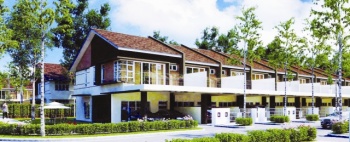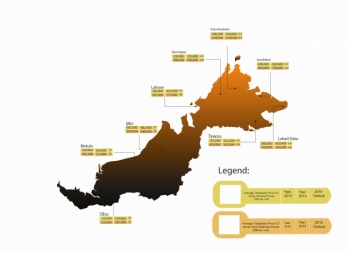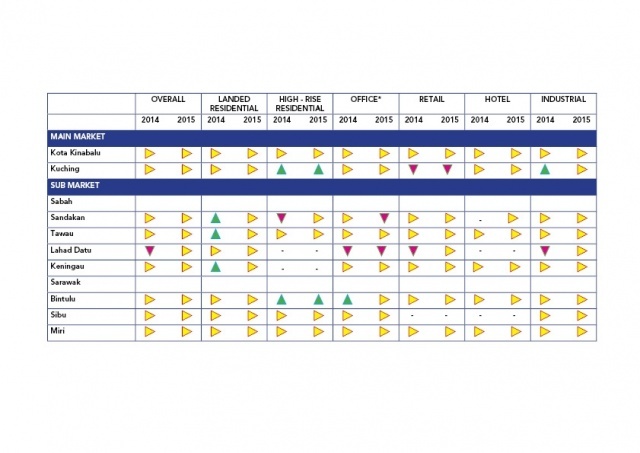
WHILEÂ a report citing Institut Rakyat director Yin Shao Loong mentioned that Sabah has the most expensive homes in Malaysia, costing some 11 times more than a family's median annual income of RM34,320 (followed by Sarawak, then Kuala Lumpur), a study by CH Williams Talhar Wong and Yeo on the property scene in Sarawak signalled growth in the last five years.
Sarawak scene
C H Williams Talhar Wong & Yeo managing director Robert Ting states: "There has been a hike in property prices in Sarawak over the last five years, recording impressive increases of between 10% and 15% per annum or even more, especially for prime residential and commercial units.
"The residential sector has seen a shift, to high-rise residential developments especially in the urban areas of the major towns and cities such as Kuching, where high-rise residential developments have even exceeded that of landed residential for its urban area.
"There has also been a huge growth in the commercial sector for Sarawak with high numbers of shophouse units coming into the market in the last few years, as well as the proliferation of retail space which has increased by more than two million sq ft for Kuching in the past five years and close to four million sq ft in the last eight years."

Ting adds that although the market has been growing at a prolific rate in the last five years, it seems to be slowing down in terms of take-up rates. However, prices are still increasing albeit at a lower rate. Price adjustments have also begun due to the implementation of GST.
In all, Ting feels that the property market in Sarawak will continue to be positive. However, property developers will see a slower intake of properties '“ "a decline in volume of sales. In short '“ prices will increase but transactions will slow down".
In fact, some sectors are already showing signs of saturation such as the commercial shophouse and retail sector with increasing vacancy rates and negotiable and reduced rentals.
The market seems to have "softened" and sales are somewhat dampened by the low buyers' sentiment following the latest negative developments in the economic and political arena of the country.
Prices of property in Sarawak is fairly low compared with KL. Then again, Ting adds, the rate of increase has been "scary" in recent years.
"This is due to the generally lower average household income in Sarawak compared with KL. There will be increasing disparity between what the market is offering and the demand of the general population should property price continue to increase at the rate it has been rising at.
"Affordability of property in Sarawak is now an issue and a pressing problem to provide good basic housing for the community at large," Ting commented.
Sabah standing
Over in Sabah, C H Williams Talhar & Wong (Sabah) managing director Robin Chung shared his views.
"For Sabah, in general, the property market has been quite active with a number of new developments launched (especially in Kota Kinabalu), which has also been going through a growth phase in the earlier part of the last five years with a rise in property prices.
But the decline in commodity prices (i.e. CPO-profits from oil palm being one of the main drivers of the property market) in the later part of 2012, the Central Bank's implementation of tighter lending guidelines and cooling measures between 2012 and 2014, plus buyers' difficulty in getting loans approved as well as less favourable economic conditions of late '¦ these have seen more cautious sentiments and transaction activities taking a breather with prices levelling off."
Price wise compared to KL property, Chung reveals that the new or on-going condominiums in KK CBD ranges between RM700 and RM1,000 per sq ft '¦"roughly averaging to RM800 to RM850 per sq ft whereas we are made to understand that recent launches in the Golden Triangle area in KL would average RM1,600 to RM1,800 per sq ft."
Generally, there are no restrictions to purchasing land held under the "Country Lease". However, land held under "Native Title (NT) are restricted to the natives of Sabah only. NT land can however, be sub-leased to non-natives but for a period not exceeding 30 years," informs Chung.
It's all about perspective
"Stringent financial borrowing guidelines and other measures taken by the government via its financial institutions have also eased speculative purchases.
On the positive side, these cooling measures have resulted in market corrections in some sectors, preventing what could otherwise be a runaway situation in terms of market pricing and overhang," informs Ting.
In general, investment type property in Sabah and Sarawak are said to be comparatively new as most properties are owner occupied rather than purchased for investment purposes. However, times are changing says Ting. "Good location, established areas and areas with potential are still worth investing."
Chung, however, gives Sabah the nod.
"In terms of investment, where long-term capital gains and rent returns are concerned, albeit presently hardening yields with the relatively steep rise in property values over the past years.
"However, most of the investment interest would be focused in KK, which is the administrative, education, business and services hub and the main gateway to Sabah where the majority of the population is centred. It is the focal point for tourism, attracting people for education, business and employment opportunities, which will drive demand for properties."
His take on the Sabah outlook in general: "For the near term '¦ it would be rather subdued given present market conditions."
As at the end of last year, the All House Price Index for Sabah stood at 295.6 points (up from 293.3 during the same period the year before), with residential and commercial sub-sectors experiencing growth in terms of value of 6.7% and 5.8% respectively.
Reports claim that many projects due for launch this year are put on hold (eg. Tuaran's shopping mall) as developers "watch and wait out" the unsure development situation in the country.
Nevertheless, ask property gurus like Milan Doshi and Tan Hwa Chuan along with many others who will agree that the best time to buy property is when others fear to do so '¦ "provided the location is good, you can secure good financing and you have negotiated yourself a good deal!"



